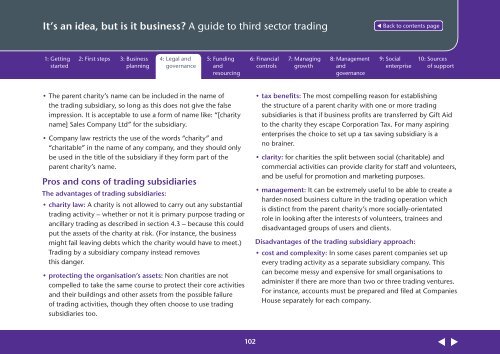A guide to third sector trading - WCVA
A guide to third sector trading - WCVA
A guide to third sector trading - WCVA
Create successful ePaper yourself
Turn your PDF publications into a flip-book with our unique Google optimized e-Paper software.
It’s an idea, but is it business? A <strong>guide</strong> <strong>to</strong> <strong>third</strong> sec<strong>to</strong>r <strong>trading</strong><br />
1: Getting<br />
started<br />
2: First steps 3: Business<br />
planning<br />
4: Legal and<br />
governance<br />
5: Funding<br />
and<br />
resourcing<br />
6: Financial<br />
controls<br />
7: Managing<br />
growth<br />
8: Management<br />
and<br />
governance<br />
9: Social<br />
enterprise<br />
10: Sources<br />
of support<br />
• The parent charity’s name can be included in the name of<br />
the <strong>trading</strong> subsidiary, so long as this does not give the false<br />
impression. It is acceptable <strong>to</strong> use a form of name like: “[charity<br />
name] Sales Company Ltd” for the subsidiary.<br />
• Company law restricts the use of the words “charity” and<br />
“charitable” in the name of any company, and they should only<br />
be used in the title of the subsidiary if they form part of the<br />
parent charity’s name.<br />
Pros and cons of <strong>trading</strong> subsidiaries<br />
The advantages of <strong>trading</strong> subsidiaries:<br />
• charity law: A charity is not allowed <strong>to</strong> carry out any substantial<br />
<strong>trading</strong> activity – whether or not it is primary purpose <strong>trading</strong> or<br />
ancillary <strong>trading</strong> as described in section 4.3 – because this could<br />
put the assets of the charity at risk. (For instance, the business<br />
might fail leaving debts which the charity would have <strong>to</strong> meet.)<br />
Trading by a subsidiary company instead removes<br />
this danger.<br />
• protecting the organisation’s assets: Non charities are not<br />
compelled <strong>to</strong> take the same course <strong>to</strong> protect their core activities<br />
and their buildings and other assets from the possible failure<br />
of <strong>trading</strong> activities, though they often choose <strong>to</strong> use <strong>trading</strong><br />
subsidiaries <strong>to</strong>o.<br />
• tax benefits: The most compelling reason for establishing<br />
the structure of a parent charity with one or more <strong>trading</strong><br />
subsidiaries is that if business profits are transferred by Gift Aid<br />
<strong>to</strong> the charity they escape Corporation Tax. For many aspiring<br />
enterprises the choice <strong>to</strong> set up a tax saving subsidiary is a<br />
no brainer.<br />
• clarity: for charities the split between social (charitable) and<br />
commercial activities can provide clarity for staff and volunteers,<br />
and be useful for promotion and marketing purposes.<br />
• management: It can be extremely useful <strong>to</strong> be able <strong>to</strong> create a<br />
harder-nosed business culture in the <strong>trading</strong> operation which<br />
is distinct from the parent charity’s more socially-orientated<br />
role in looking after the interests of volunteers, trainees and<br />
disadvantaged groups of users and clients.<br />
Disadvantages of the <strong>trading</strong> subsidiary approach:<br />
• cost and complexity: In some cases parent companies set up<br />
every <strong>trading</strong> activity as a separate subsidiary company. This<br />
can become messy and expensive for small organisations <strong>to</strong><br />
administer if there are more than two or three <strong>trading</strong> ventures.<br />
For instance, accounts must be prepared and filed at Companies<br />
House separately for each company.<br />
102












